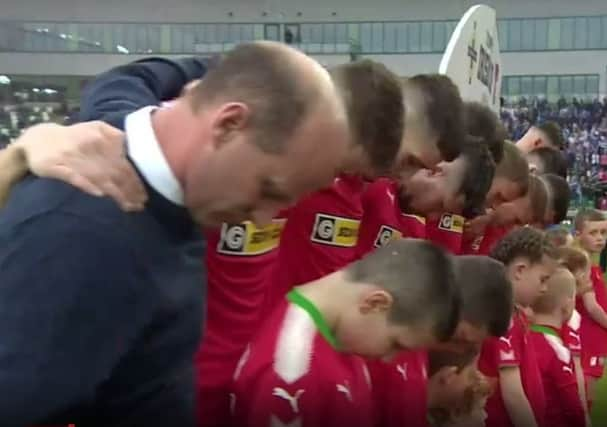Graceless gesture by Cliftonville hurt case for ending anthem


It is frequently described as the oldest team in Ireland – though that status is disputed, not least by local soccer historian, Martin Moore.
The club now draws its support mainly from nationalist areas in north and west Belfast, but for most of its history it had no particular religious or political affiliations.
Advertisement
Hide AdAdvertisement
Hide AdCliftonville should be above ugly, inflammatory gestures of the kind that its players engaged in on Saturday.


As the National Anthem played before the Irish Cup final, the Reds’ team ostentatiously bowed their heads for its duration, while their supporters generated a cacophony of ill-mannered boos and jeers.
It was a premeditated display of contempt and a deeply political act, calculated to create controversy at football’s showpiece occasion.
The club had asked the Irish Football Association (IFA) to refrain from playing God Save the Queen before the match, but its request was denied. When Cliftonville last reached the final, back in 2013, the anthem wasn’t played, because the IFA said it was aiming to create a “politically neutral” atmosphere.
Advertisement
Hide AdAdvertisement
Hide AdIt has since changed that policy and perhaps the reversal was regrettable.
There is a compelling argument to end the tradition of playing God Save the Queen at cup finals, just as the Northern Ireland international team should probably have its own unique sporting anthem.
In both cases, we’re celebrating the best of Northern Irishness, rather than Britishness, and the occasions are local rather than UK-wide.
If the IFA decided that no anthem was needed before the Irish Cup final, its policy would be perfectly appropriate and it might make some nationalists feel more welcome at the match, which would be a happy bonus.
Advertisement
Hide AdAdvertisement
Hide AdParadoxically, Cliftonville has now made it more difficult for the sport’s governing body to take a measured decision, thanks to the players’ politically-charged protest.
Their calculated display of disrespect will stiffen resistance among member clubs and supporters who value their British heritage and feel the anthem reflects their identity.
I attended the 2013 cup final and sat among Glentoran fans, who come chiefly from a unionist background. Outside the National Stadium, there were some protests at the IFA’s decision not to play God Save the Queen, but in the North Stand, most supporters were focused on the match rather than the trappings that surrounded it.
Yet the following year, when Ballymena United faced Glenavon, the anthem was back.
Advertisement
Hide AdAdvertisement
Hide AdIf the IFA had stuck to its 2013 policy, it’s unlikely many football fans would have noticed or cared. By now, like rattles, marching bands at half-time, and communal singing, the anthem would be a quaint tradition that had been quietly abolished.
Instead, it was reinstated (without controversy, because few Ballymena or Glenavon supporters are hostile to God Save the Queen) and it’s been played every year since.
Of course, the IFA mustn’t implement different policies from year to year, depending on whether the cup finalists are perceived as unionist or nationalist. The idea that the anthem can be played, except when Cliftonville gets to the final, is manifestly ludicrous. There would be no better way to highlight divisions and foster resentment.
When all’s said and done, Northern Ireland is part of the UK and anyone who genuinely respects the principle of consent accepts its British status.
Advertisement
Hide AdAdvertisement
Hide AdThe national anthem here is God Save the Queen and, while there are different opinions on whether or not it should be played at particular events, neither can it be considered inappropriate or offensive. Nobody expects the Cliftonville players or their fans to belt it out with gusto, but it’s not a lot to ask that they stand respectfully and silently for two minutes.
In comparison to Gaelic games, this type of symbolism is deployed relatively infrequently in local football.
In its more enlightened moments the GAA claims it is open to people from across the community, yet it is unabashed about its republican ethos and the Republic’s anthem and flag are present at every club or county match. The IFA retains God Save the Queen only at the Irish Cup final and before Northern Ireland games, where an anthem is required by FIFA.
There have been lengthy discussions in the football family about changing this vestige of patriotism and the governing body has often looked like it’s edging toward that outcome, under the principle ‘Football for All’.
Advertisement
Hide AdAdvertisement
Hide AdThese efforts have been slowed down because of objections from some unionists, who suspect that nationalists and republicans are involved in an insidious campaign to remove the last traces of Britishness from every aspect of Northern Irish life.
The case for reform has been damaged by Cliftonville’s graceless, undignified demonstration, which serves only to nourish those suspicions.
It’s a great shame to see one of Ireland’s finest old sports clubs reduced to aggressive, republican politicking. As a Ballymena United supporter, I’m loath to say it, but, this year, it was poetic justice when Coleraine lifted the cup.